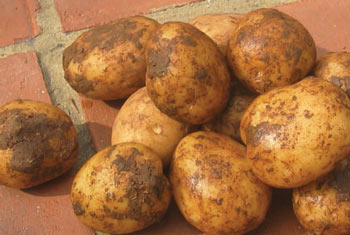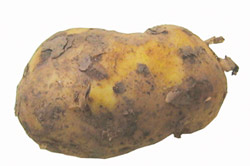|
|
Potato allergy and intolerance |
Dr Janice Joneja runs an ongoing Q&A feature on the FoodsMatter website mainly devoted to histamine intolerance but recently she received two queries about reactions to potato. Here are the questions and her answers. |
Question 1: 
My son is allergic to quite a number of foods, including anaphylactic reactions to milk and nuts. I took him off of potatoes at around 1 when I noticed him breaking out with eczema when he would eat a potato. He recently tested a “3” in blood work to potatoes and so we continue to avoid potatoes. I was wondering if potato starch is likely to trigger an allergic reaction. Question 2: I have been suffering from chronic stomach pain for over a month. I have 4 different types of discomfort: deep seated grinding, sharp stabbing, mild to dull and neuralgic sore to touch pain. The pain came on out of nowhere and five different doctors can find no cause despite various medications and an ultrasound. They tell me the problem for them is that I'm so healthy! Over the years, I have increasingly found that potato is very hard to digest. Boiled potatoes make me feel as if I have swallowed a stone and lie heavy on my stomach. Mashed potatoes are slightly better but still lie heavy on my stomach. I usually find that I will always leave at least some potato on my plate. Could this be a new intolerance symptom that has only just shown itself? My sore stomach doesn't appear after eating potato; it is constantly there. As I frequently eat potato is it possible that trace elements remain in my system and so my stomach is constantly irritated? I have decided to stop potato to see my stomach pain resolves. Dr Joneja says: Thank you both for your queries, which allow me to explain some rather complex science, but with practical suggestions for their clinical management. Exactly what a scientist/clinical practitioner/dietitian such as myself greatly enjoys. Although I do not have sufficient information to make a definitive diagnosis in either case, I shall discuss two aspects of adverse reactions to potato which will explain each of these situations. First of all, question 1 indicates an IgE-mediated allergy to potato, which I am assuming since “blood work” was mentioned. Research is showing that every food contains several different proteins, some of which have the potential to trigger an allergic reaction. Potatoes have been demonstrated to contain five different allergenic molecules, designated Sol t1; Sol t2; Sol t3 (2 types); Sol t4. [1] A person may be sensitized to any one or more of these allergenic molecules. The little boy in Question 1 is definitely sensitized to at least one of these allergenic molecules and therefore is likely to develop allergy symptoms when he consumes potatoes. Eczema is a common symptom of food allergy in young children. Potato starch will also contain the allergenic molecules and so must be avoided. 
Question 2, in contrast, indicates that the questioner may be intolerant of potato by a quite different mechanism. There is no evidence of allergy in the query. However, it would appear that the problem lies in the way that the starch in the potato is digested. Most starches in cereal grains and legumes are readily digested by pancreatic enzymes (amylase) in the small intestine and absorbed into circulation. However, some plants contain starch that resists this digestive process, and instead of being broken down and absorbed, passes into the colon or large bowel intact. This is termed resistant starch. [2] This starch is then available to micro-organisms in the colon, which use it for their growth and multiplication by a process of fermentation, the products of which are organic acids and gas. Potatoes contain resistant starch. The quantity of resistant starch that a person consumes in a food such as potato, is critically dependent on processing conditions. Starch from freshly cooked, hot potato is generally well-digested, but as the potato cools less of the starch is digested and thus passes into the colon to be fermented by micro-organisms. In an important experiment, only 3% of starch in freshly-cooked potato remained undigested in contrast to 12% in cooled potato. After reheating, 8% of the starch was still undigested. [3] You are most likely experiencing pain as a result of the production of organic acids and gas by the micro-organisms fermenting the potato starch in your large bowel. The gas causes pressure on very sensitive nerves in the abdomen, thus creating the grinding, stabbing, sore to touch type of pain that you describe. This will typically develop some time after you have consumed potato because it takes time for the micro-organisms to act on the starch and produce the gas. Unfortunately, that is not the only consequence: the micro-organisms are actively multiplying as they ferment the starch, so you now have many more of them than when your symptoms first started. You will need to reduce your intake of resistant starch for some time in order to reduce the numbers of the fermentative strains in your digestive tract. Although you have discovered that potato is at least one culprit, there are others. The food that seems to contain more resistant starch than most others is raw banana. In the experiment I referred to above, 89% of the starch from a raw banana passed into the colon intact. Cooking the banana reduces the amount of resistant starch in the food. The heat “opens up” the granules in which the starch is stored, so it is then available for breakdown by pancreatic enzymes and digested before it can pass into the colon. A low carbohydrate diet will help to reduce the number of fermentative micro-organisms in your bowel. Certainly avoid potatoes. I would advise you to try this for a time. You will find an appropriate diet, with meal plans and recipes in my book, “Digestion, Diet and Disease”. I think you will find this helpful. [1] Seppl1 U, Majamaa H, Turjanmaa K, Helin J, Reunala T, Kalkkinen, N, Palosuo T. Identification of four novel potato (Solanum tuberosum) allergens belonging to the family of soybean trypsin inhibitors. Allergy: European Journal of Allergy and Clinical Immunology July 2001;56(7):619626 [2] Joneja, JMV. Chapter 6: The role and function of microorganisms in the digestive tract. In: Digestion, Diet and Disease: Irritable Bowel Syndrome and Gastrointestinal Function. New Jersey. Rutgers University Press. 2004
[3] Englyst HN, Kingman Sm. Dietary fibre and resistant starch: A nutritional classification of plant polysaccharides. In: Dietary Fibre, ed. D.Kritchevski, C Bomnfield, JW Anderson, 49-65. 1994 New York, Plenum Publishing Co. June 2015 Nota Bene. You can buy all of Dr Joneja's books here in the UK or here in the US and you can buy DAO supplements here in the UK or here in the US.
|












